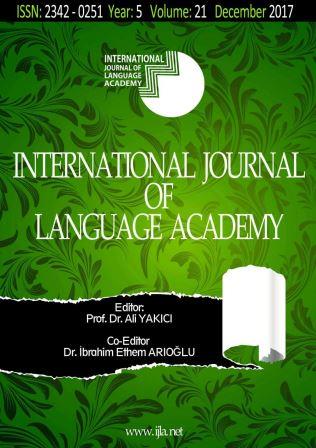YÜKSEKÖĞRETİMDE UZAKTAN EĞİTİM PROGRAMIYLA TÜRK DİLİ DERSİNİ ALAN ÖĞRENCİLERİN DERSE KARŞI TUTUMLARI (GÜMÜŞHANE ÜNİVERSİTESİ ÖRNEKLEMİ)
Author :
Abstract
Rapidly developing science and technology affect individuals in all aspect of their lives. Obtaning information easier than before has established a ground for building an information society. Today, continuously improving and changing technology provide new opportunities for individuals in educational fields as well. One of these opportunities is “distance education” programme in higher education. The purpose of this study is to determine the attitudes of students taking Turkish Language lesson through distance education program. This study was conducted with scanning method, one of the descriptive models. With this method, information required to be learnt is directed to the sample group and their responds and views are received, or their attitudes can be determined. The sample of study consists of 300 students who take Turkish Language lesson through distance education programme in Gümüşhane University from various departments, faculties and vocational schools of higher education in 2016-2017 educational period. In accordance with the purpose of the study, relevant literature was scanned in order to determine the students’ attitudes and by receiving opinions of lecturers and academics in Turkish Language department, 20 items 5-point likert scale “Attitudes of Higher Education Students to Turkish Language” was developed and the points were classified as ‘I strongly agree, I agree, Neutral, I disagree, I strongly disagree’. As a result of the analysis, acceptability and validity level of the scale was determined as 0,84 in Cronbach’s Alpha and 0,651 in KMO (Kaiser-Meyer-Olkin). At the end of the study, it was determined that most students who take Turkish Language lesson through Distance Education programme in survey have negative attitudes to Turkish Languge lesson as ‘I disagree, I strongly disagree’.
Keywords
Abstract
Rapidly developing science and technology affect individuals in all aspect of their lives. Obtaning information easier than before has established a ground for building an information society. Today, continuously improving and changing technology provide new opportunities for individuals in educational fields as well. One of these opportunities is “distance education” programme in higher education. The purpose of this study is to determine the attitudes of students taking Turkish Language lesson through distance education program. This study was conducted with scanning method, one of the descriptive models. With this method, information required to be learnt is directed to the sample group and their responds and views are received, or their attitudes can be determined. The sample of study consists of 300 students who take Turkish Language lesson through distance education programme in Gümüşhane University from various departments, faculties and vocational schools of higher education in 2016-2017 educational period. In accordance with the purpose of the study, relevant literature was scanned in order to determine the students’ attitudes and by receiving opinions of lecturers and academics in Turkish Language department, 20 items 5-point likert scale “Attitudes of Higher Education Students to Turkish Language” was developed and the points were classified as ‘I strongly agree, I agree, Neutral, I disagree, I strongly disagree’. As a result of the analysis, acceptability and validity level of the scale was determined as 0,84 in Cronbach’s Alpha and 0,651 in KMO (Kaiser-Meyer-Olkin). At the end of the study, it was determined that most students who take Turkish Language lesson through Distance Education programme in survey have negative attitudes to Turkish Languge lesson as ‘I disagree, I strongly disagree’.





